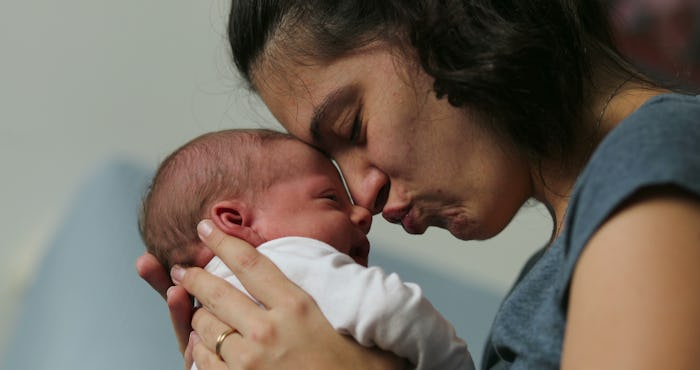Wondering why your baby begins to cry the minute you leave the room even though newborns can only see 8-15 inches away? Or how she seems to turn her head towards you even when she's sleeping? It's the same reason why a blanket you use to rock your baby seems to calm them even when you’re not holding them: The nose knows, as they say. Even the tiniest of babies can recognize their mother’s scent.
“One hundred percent, they can recognize your scent when they’re born,” says pediatrician Dr. Dyan Hes. “They recognize you from the smell of the amniotic fluid.”
Scientists suggest that a baby's sense of smell develops as early as six weeks in utero. Thanks to amniotic fluid, your baby is smelling you all the time. (And he’s tasting and smelling the food you eat, too.) This fragrance bond only increases with breastfeeding once a baby is born, as mothers metabolize what they eat into milk. And for good reason: Like cuddling and feeding, the smell connection plays a big role in establishing attachment.
As the Association for Psychological Science explained, “the attachment bond between a mother and her child is first formed in the womb, where fetuses have been found to develop preferential responses to maternal scents and sounds that persist after birth.” So even in utero your baby is developing an appreciation for your odor. It's all part of our built-in survival mechanism designed to help mammals find their mothers after birth. "Breast odors from the mother exert a pheromone-like effect at the newborn's first attempt to locate the nipple," research in Communicative & Integrative Biology found.
And, ready to have your mind really blown? Experiments have shown that mothers are equally able to identify their own infants based on smell, too the same study reported. Olfactory communication, as it's called in scientific circles, is a critical component of pregnancy and post-pregnancy, and allows an infant to develop a relationship with its mother while ensuring it finds nourishment after leaving the womb.
So will giving yourself a spritz of new perfume interrupt this scented connection? Dr. Hes says no, baby won’t mind. As long as you’re the one wearing it, they’re happy with it. However, she cautions parents to avoid using essential oils.
“They can be very toxic to babies' lungs,” says Hes. “Don’t put lavender oil or eucalyptus oil into a Vicks Vaporizer, either.” Essential oils can also be bad for baby’s delicate skin. Although more research is needed, for now Hes tells the parents of her patients to avoid them.
Instead, consider just enjoying the magical unseen olfactory bond you have with your babe. It might be the last time someone wants to snuggle and sniff you this much even when you haven’t showered in days.
Experts:
Dr. Dyan Hes, pediatrician at Gramercy Pediatrics in New York City and a Director of the American Board of Obesity Medicine.
Study referenced:
Vaglio, Stefano. “Chemical communication and mother-infant recognition.” Communicative & integrative biology vol. 2,3 (2009): 279-81. doi:10.4161/cib.2.3.8227 https://www.ncbi.nlm.nih.gov/pmc/articles/PMC2717541/
